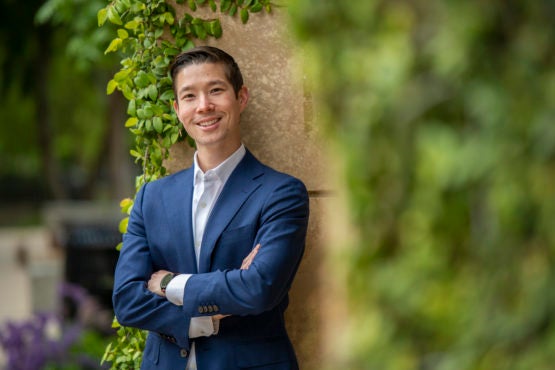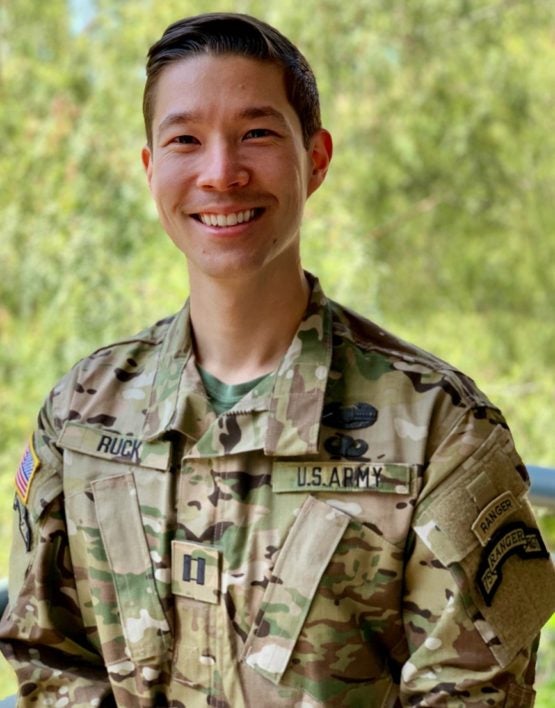A calling for public service
Commencement will be an ending and beginning for law student Jimmy Ruck, who supported the return of ROTC to Stanford as an undergraduate and became an Army Ranger. Soon, he’ll continue his public service career as a law clerk for a 10th Circuit Court of Appeals judge in Colorado.
Jimmy Ruck’s upbringing in a military family, as well as his own military service, has taken him all over the country and the world for long periods of time. But of all the places he’s lived, none is more familiar than Stanford.
“I’ve never lived anywhere longer than on the Stanford campus,” he said. “It’s like a home for me.”
After seven nonconsecutive years on the Farm – four as an undergrad and three as a law student – Ruck will soon say goodbye. Following next month’s Commencement, he’ll relocate to Denver, where he’ll clerk for a federal court of appeals judge. It’s just the latest job in a young, albeit impressive career dedicated to public service.

Following Commencement, Jimmy Ruck, BA ’11, JD ’19, will relocate to Denver, Colorado, to clerk for a federal court of appeals judge. (Image credit: L.A. Cicero)
Service is nothing new to Ruck’s family. Both his grandfather and father served in the Army. Ruck, who was born in Boston, spent his childhood at West Point, New York, where his father taught at the United States Military Academy, and later in North Carolina. Although this early exposure to the military had an indelible impact on him, he said it wasn’t what ultimately inspired him to join the armed forces.
“What really drove it home was 9/11,” said Ruck, who was in the seventh grade and living in the Bay Area at the time. “I knew in that moment that I had my calling, that I wanted to serve in the Army and I wanted to help our country in whatever capacity possible.”
In 2007, Ruck brought that calling to Stanford when he enrolled as an undergraduate.
Advocating for ROTC
For many American college students interested in military service, Reserve Officers Training Corps (ROTC) classes are their main point of entry. But at Stanford, those opportunities were limited because the university had terminated academic credit for ROTC courses in 1970. By 1973, it had phased out its Army, Navy and Air Force ROTC programs. Stanford undergrads interested in taking ROTC courses would have to do so at neighboring universities.
During his four years as an undergraduate, Ruck would wake up before dawn three or four days a week and travel to Santa Clara University for Army cadet training. Back at Stanford, he led a small contingent advocating for the return of ROTC, which he felt was crucial to the education of those interested in the military.
“Stanford strives to produce leaders in business, politics, medicine and across all fields,” he said. “It was missing a vital opportunity to shape the minds and character of future leaders of the military.”
This group led a campaign that included town halls and meetings with students, administrators and other stakeholders. Their efforts paid off when the Faculty Senate voted in favor of reinstating ROTC. Despite the vote, the U.S. military was unable to hold courses at Stanford for a number of reasons, including its budgetary constraints. However in 2012, after Ruck graduated, Stanford began offering activity and academic credit for ROTC courses that Stanford students took at other universities.
A history major with honors in international security studies, Ruck also took an interest in foreign policy and national security issues. He cited classes with former U.S. Secretary of State Condoleezza Rice, former U.S. Secretary of Defense William Perry and former Clinton administration advisor Coit Blacker as among his favorites.
Ranger School
In 2011, Ruck graduated from both Stanford and the ROTC program at Santa Clara University. He immediately began a year-long Army training period that included a stint in Washington state to teach and evaluate cadets, and four months in Arizona where he received training to be an intelligence officer. There he had an opportunity to try out for the Army’s 75th Ranger Regiment, an elite, highly selective, special operations unit.

Jimmy Ruck served in the U.S. Army for over five years before attending Stanford Law School. (Image credit: Courtesy Jimmy Ruck)
After passing that initial selection process, he relocated to Georgia and later Florida to attend the Army’s Ranger School. The grueling 64-day training involved three phases of intense combat simulations in which trainees underwent extreme sleep deprivation and hunger. The process is meant to teach potential Rangers how to handle the stresses that come with combat and to push them beyond the limits imposed by the mind. Ruck said it’s also meant to teach them the importance of camaraderie.
“I remember so many instances throughout Ranger School where I had to rely on my team,” Ruck said. “You rise and fall as a team. That concept really became evident to me throughout that process.”
After successfully graduating Ranger School, Ruck served a one-year assignment in South Korea, where he was stationed roughly 13 miles from the Demilitarized Zone. Ruck then served in the 75th Ranger Regiment, where he completed three combat deployments to Afghanistan between 2013 and 2016.
Pursuing a legal career
Ruck said that he’d never given much thought to a legal career until the Army sent him to Washington, D.C., for his final assignment working with the CIA on counter-terrorism and national security issues. As part of his role, the agency selected him to attend National Security Council meetings, including two at the White House, and to work alongside attorneys who were making high-level foreign policy decisions for the United States.
“After interacting with them and seeing how much they were driving the process, not just playing behind the scenes, but really helping steer the policy, I became intrigued by the idea of going to law school,” Ruck said.
After five and a half years in the Army, he returned to Stanford as a law student. Since then he’s put his legal training to good use through pro bono work. And through the Youth and Education Law Project, he was able to represent special-needs schoolchildren and their families at meetings and hearings with school districts that weren’t providing legally mandated services.
After he receives his JD degree next month, he’ll begin a full-time clerkship for a federal judge on the 10th Circuit Court of Appeals in Denver, Colorado. Asked what his long-term career plans are, he said he wasn’t exactly sure, but still had a desire to serve the country.
“I want to have a significant influence on our country’s foreign policy and national security. That’s where my interests, especially from undergrad, have always lain,” he said.
